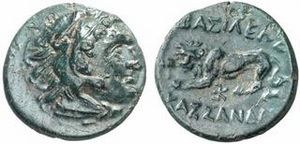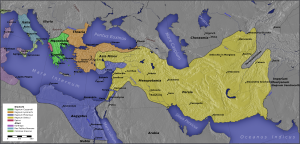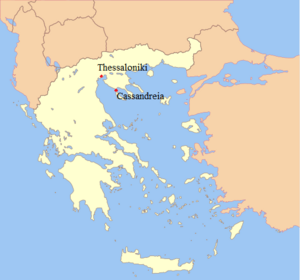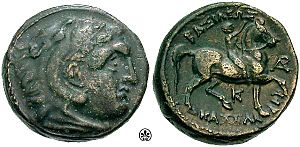Cassander facts for kids
Quick facts for kids Cassander |
|
|---|---|

A coin of Cassander. It shows a lion and the words "King Cassander" in Ancient Greek.
|
|
| King of Macedonia | |
| Reign | 305 – 297 BC |
| Predecessor | Alexander IV |
| Successor | Philip IV |
| Born | 355 BC |
| Died | 297 BC (aged 58) Pella |
| Spouse | Thessalonike of Macedon |
| Issue |
|
| House | Antipatrid dynasty |
| Father | Antipater |
| Religion | Ancient Greek Religion |
Cassander (Greek: Κάσσανδρος; born around 355 BC – died 297 BC) was a powerful ruler in Ancient Greece. He became king of the ancient Greek kingdom of Macedonia from 305 BC until his death in 297 BC. He was also the real ruler of southern Greece from 317 BC.
Cassander was the son of Antipater, one of Alexander the Great's most trusted generals. After Alexander the Great died in 323 BC, Cassander became one of the Diadochi. These were Alexander's generals who fought over his huge empire. Cassander took control of Macedonia by having Alexander's young son and heir, Alexander IV, killed.
While ruling Macedonia, Cassander worked to make the northern borders strong. He also helped the economy grow. He founded or rebuilt several important cities, like Thessalonica, Cassandreia, and Thebes. However, he was very tough on his political enemies. This makes it hard for historians to fully judge his rule.
Early Life and Education
When Cassander was young, he was taught by the famous philosopher Aristotle. This happened at the Lyceum in Macedonia. He studied alongside Alexander the Great and other important figures. These included Hephaestion, Ptolemy, and Lysimachus. His family was distantly related to the Argead dynasty, which was Alexander's royal family.
Cassander first arrived at Alexander the Great's court in Babylon in 323 BC. His father, Antipater, sent him there. Antipater likely wanted Cassander to help keep his power in Macedon. Cassander left Alexander's court shortly before or after Alexander's death. He did not take part in the first power struggles over the empire.
Cassander returned to Macedonia and helped his father rule. Later, Antipater assigned him to Antigonus. This was probably to keep an eye on Antigonus's actions.
Becoming King of Macedon

As his father Antipater was dying in 319 BC, he chose Polyperchon to rule Macedonia. He did not choose Cassander. Cassander disagreed with this decision. He immediately sought help from other powerful generals. These included Antigonus, Ptolemy, and Lysimachus.
Cassander then went to war against Polyperchon. He destroyed Polyperchon's fleet and took control of Athens. In 317 BC, Cassander declared himself the acting ruler. Later that year, Alexander's mother, Olympias, took action against Philip III. Cassander then surrounded Olympias in Pydna. When the city fell in 316 BC, Olympias was killed. Cassander then imprisoned Alexander IV and Roxana at Amphipolis.
In 316 BC, Cassander connected himself to the royal family. He married Thessalonike, who was Alexander's half-sister. He also oversaw the burial of Phillip III and Eurydice in the royal cemetery. He made his power stronger by founding new cities. These included Thessalonica and Cassandreia. He also rebuilt the city of Thebes.
From 314 to 310 BC, Cassander campaigned to the west and north. He expanded Macedonian power for a time. His rule in Macedonia stayed strong. He moved defeated enemies to new areas, like Phillip II used to do. He also encouraged trade around his new cities. Cassander had Alexander IV and Roxana secretly poisoned around 310 BC.
By 309 BC, Polyperchon claimed that Heracles was the true heir to Macedonia. Cassander then paid Polyperchon to kill the boy. He promised Polyperchon an alliance and his Macedonian lands back. After this, Cassander's position in Greece and Macedonia was quite safe. He declared himself king in 305 BC.
Wars and Later Years
From 307 to 304 BC, Cassander fought a war against Athens. In 304 BC, his rival Antigonus Monophthalmus sent his son Demetrius Poliorcetes to help Athens. Demetrius pushed Cassander out of central Greece. He then created a league of Greek cities against Cassander.
In the winter of 303–302 BC, Cassander tried to make peace with Antigonus. But Antigonus refused. So, Cassander turned to Lysimachus, Ptolemy, and Seleucus. He convinced them to form an alliance against Antigonus again. In early 302 BC, Cassander sent his general, Prepelaus, to join Lysimachus. They invaded Antigonus's land in Asia Minor.
Cassander himself marched his main army into Thessaly. He wanted to stop Demetrius from moving into Macedon. Demetrius had a larger army. But Cassander stopped his advance by avoiding battle and fortifying his positions. Lysimachus and Prepalaus had been very successful in Asia Minor. Seleucus was also marching with an army to join them.
In the spring of 302 BC, Antigonus marched his army from Syria into Asia Minor. He wanted to face his enemies. He fought Lysimachus and drove him from Phrygia. Antigonus realized the war would likely be decided in a big battle in Asia Minor. So, he called Demetrius back from Thessaly. With Demetrius gone, Cassander sent part of his army. His brother, Pleistarchus, led them to join Lysimachus and Seleucus in Asia Minor.
In 301 BC, the combined armies of Lysimachus, Seleucus, Prepalaus, and Pleistarchus fought Antigonus and Demetrius. This was the Battle of Ipsus. Antigonus was killed in this battle. After this, Cassander was clearly in control of Macedon. However, he did not have much time to enjoy it. He died of a disease called dropsy in 297 BC.
Cassander's family did not rule for long after his death. His son Philip died naturally. His other sons, Alexander and Antipater, fought each other for power. When Alexander was removed as co-king, Demetrius I helped him. Demetrius then removed Antipater, killed Alexander V, and started his own ruling family.
Cassander's Impact

Cassander was known for not liking Alexander the Great's memory. Some stories say he felt sick when he saw a statue of Alexander. Cassander has been seen as ambitious and not caring about others. Even his own family members sometimes did not get along with him. However, some historians believe these stories were spread by his rivals.
Cassander was responsible for the deaths of more members of Alexander's family than other generals. This included Alexander IV, Roxana, and Alexander's supposed son Heracles. He also allowed Olympias to be killed. However, other generals were also willing to kill Alexander's relatives if it helped them.
Evidence from coins suggests Cassander's actions were about keeping his own power. They were not always about wanting to be king or rivaling Alexander. Cassander decided to rebuild Thebes. Alexander had destroyed this city. This was seen as a challenge to Alexander. But it also gave Cassander a strong base in Boeotia.
Like other generals, Cassander used royal symbols that linked him to Alexander the Great. Other generals showed themselves and Alexander on their coins. Cassander followed Alexander's example. He had himself or the dead king wearing a lion-skin cloak on his coins. These royal symbols set patterns for coins that lasted a long time.
Cassander also made a lasting impact by renaming Therma to Thessalonica. He named the city after his wife. Cassander also founded Cassandreia on the old city of Potidaea. He also founded the city of Antipatreia.
|
See also
 In Spanish: Casandro de Macedonia para niños
In Spanish: Casandro de Macedonia para niños
 | James Van Der Zee |
 | Alma Thomas |
 | Ellis Wilson |
 | Margaret Taylor-Burroughs |


